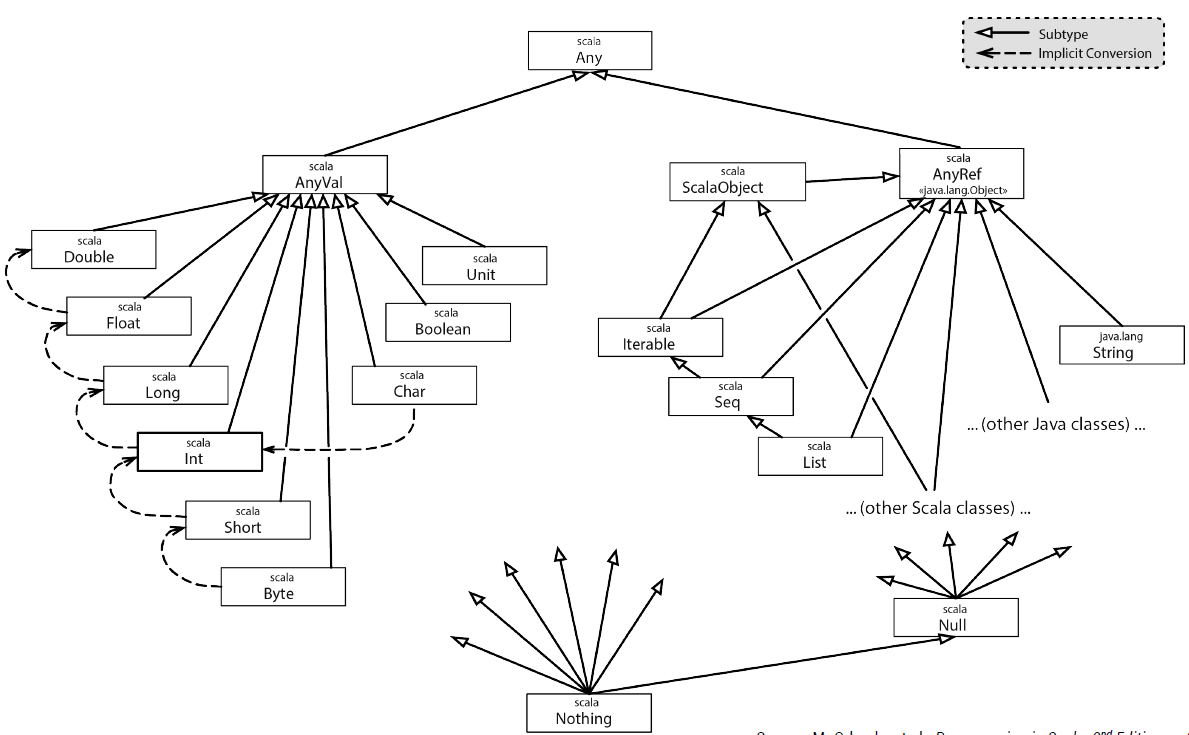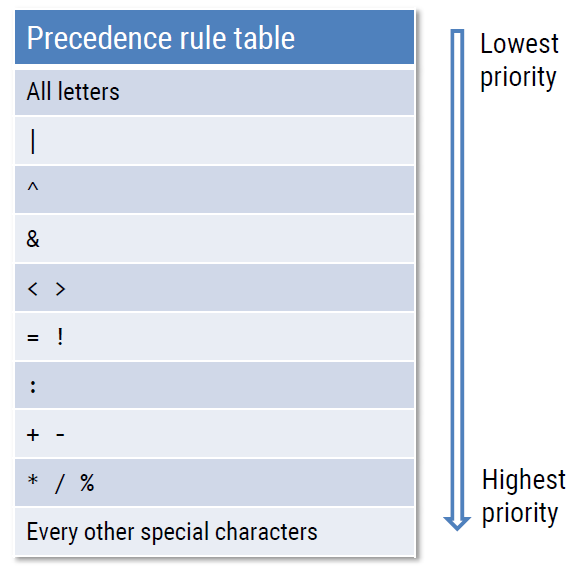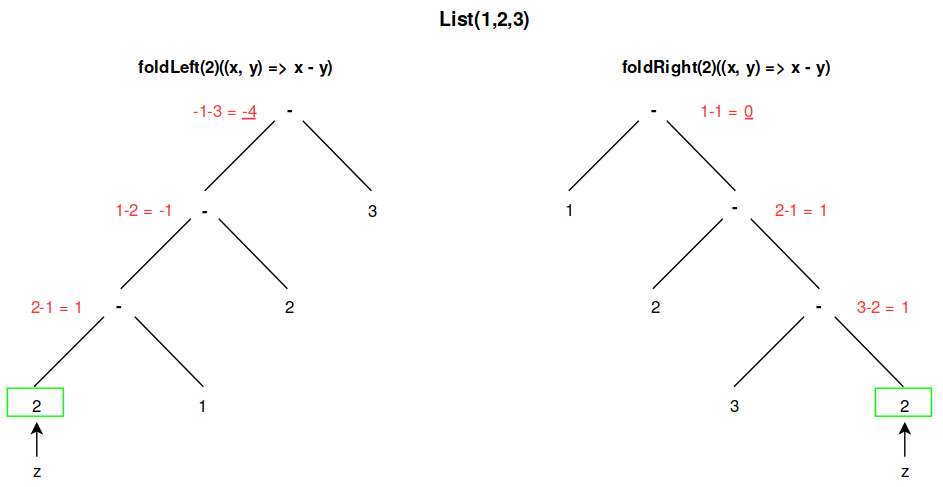Principes Functional programming
Stateless
- Data immutable => no side effects
- Same params => Same result
Referential Transparency
An expression is referentially transparent (RT) if it can be replaced by its value.
Pure functions are RT:
- Returns always the same result for the same input
- No side effect (nor output)
- Enables to cache the function result for an input, and then re-use it without executing the function (gain of time)
Examples:
sin(x) // Referentially Transparent
length(s) with s a String // RT
currentTime() // NOT RT
printf() // NOT RT (car écrit sur console => output)
Call-by-value vs Call-by-name
Call-by-value:
-
Args are evaluated before being passed to the function
-
Args are evaluated once and only once
def first(x: Int, y: Int) = x
Call-by-name:
-
Args are not evaluated if not used, otherwise evaluated in each occurrence
def first(x: Int, y: => Int) = x
Addressing a problem in FP
We can often use one of these solutions to address a problem in functional programing:
- Recursion (or tailRecursion) + pattern matching
- Higher Order Function (HOF)
- Mix 1 and 2
- Sequence comprehensions
Divers
// import library used for @tailrec notation
import scala.annotation.tailrec
/// ??? can be used for a function not already defined
def myFnct = ???
// Checking predicates
assert(predicate) // for checking if fct is working correctly
require(predicate) // for checking precondition
// system fct
sys.error(message: String)
sys.exit()
Definitions
Difference between def and var/val:
def f = expr // expr is evaluated every time it is used
val v = expr // expr is evaluated only once
Variables
var x = 1 // mutable
val x = 1 // immutable
val x:Int = 1 // explicit type
Functions
std Functions:
def incr(x: Int) = x + 1
Recursive functions:
// Function that recursively sums Ints from 'a' to 'b'
def sumInts(a: Int, b: Int) : Double =
if(a > b) 0 else a + sumInts(a + 1, b)
Call stack:
sumInts(1, 5)
1 + sumInts(2, 5)
1 + (2 + sumInts(3, 5))
1 + (2 + (3 + sumInts(4, 5)))
1 + (2 + (3 + (4 + sumInts(5, 5))))
1 + (2 + (3 + (4 + (5 + sumInts(6, 5)))))
1 + (2 + (3 + (4 + (5 + 0))))
Tail-recursive functions:
Recursive functions can be a problem because the call stack becomes bigger and bigger.
=> With Tail Recursive functions, an intermediate result is computed and given in param of the next call. This way, the call stack has a fixed size regardless of the number of recusions.
def sumIntsTail(a: Int, b: Int) : Double = {
@tailrec
def iter(a: Int, b: Int, acc: Double) : Double = { // acc is the accumulator
if(a > b) acc else tGeneSum(a+1, b, a + acc)
}
tGeneSum(a, b, 0) // expression of the block. Set the first value of the acc
}
Call Stack:
sumIntsTail(1, 5)
iter(1, 5, 0)
iter(2, 5, 1)
iter(3, 5, 3)
iter(4, 5, 6)
iter(5, 5, 10)
iter(6, 5, 15)
15
Anonymous function
// Forms
(x: Double) => x * x // with 1 param
(x: Double, y: Int) => (x+y) * 2.0 // with 2 params
// Example: a generic function for summing (with function in param that takes an Int)
def geneSum(f: Int => Double, a: Int, b: Int) : Double = {
if(a > b) 0 else f(a) + geneSum(f, a + 1, b)
}
geneSum((x: Int) => x*x*x, 1, 3) // 1^3 + 2^3 + 3^3
High order function (HOF)
Function that takes a function(s) as argument(s) or returns a function
def geneSum(f: Int => Double, a: Int, b: Int) : Double = {...} // arg1 is a function
Partial application of functions
- Allow to redefine a function with less args and static args
- set some values and reduces the arity of the base function
- partial application evaluates immediately
- Avantages: Reuse already written functions and specialise them
def adder(x: Int, y: Int) = x + y
val incr = adder(_ : Int, 1)
val add2 = adder(_ : Int, 2)
incr(18) => 19
add2(5) => 7
Currying 
- Transform an n-ary function into a chain of n unary functions (arity = nb of arg of a fct)
// Currying and partial applications example
def addCurry(a: Int)(b: Int) = a + b
addCurry(3)(4)
val inc = addCurry(1) _
inc(3)
Types
Types List:
-
a numerical :
Int, Double, Byte, Short, Char, Long, Float -
a boolean :
Boolean -
a string :
String -
function :
Int => Int; (Double, Int) => Int -
list :
List(1,2,4,7)idem as1::2::4::7::Nil -
streams :
Stream(1,2,3)idem as1#::2#::3#::Stream.empty -
tuple :
val t = ("John", 23). Can make every combination of types Tuple class:
case class Tuple2[T1, T2](_1: +T1, _2: +T2) Access

Genericity
- Makes the type as a parameter
- Applicable to functions, classes and traits
// Generic List method:
def length[T](l: List[T]): Int = // type [T], could have been [A], or [B]
l match {
case Nil => 0
case x :: xs => length(xs) + 1
}
length[Int](intsList: List[Int])
Type bounds
- Lower bound :
T >: Y- T must be a superclass of Y or Y
- Upper bound:
T <: Y- T must be a subclass of Y or Y
- View bound :
T <% Y- There must exist a conversion from T to Y
Variance
-
Covariance : Enables to use a more specific type (subclass) than the originally specified
class Variance[+A]
-
Contravariance : Enables to use a more generic type (superclass) than originally specified
class Variance[-A]
-
Invariance (or non-variance): Can only use the type originally specified
class Variance[A]
Operators
Precedence
Precedence of an operator determined by its first characters.

Oriented Object (OO)
Classes
class Rational(n: Int, d: Int) { // n and d are private
/* Preconditions */
require(d != 0) // predicate that denom isn't 0
/* Auxiliary constructors */
def this(a: Int) = this(a, 1)
/* Private methods/variables of the class (not visible outside) */
private def gcd(x: Int, y: Int) : Int = if(y == 0) x else gcd(y, x % y)
private val g = gcd(n, d) // val = like a constant (executed at construction only)
/* variables of the class */
def num = n / g // simplification of the fraction by the gcd during the constr
def denom = d / g
/* methods of the class */
def +(that: Rational) = { // operator '+' redefinition for Rational type
new Rational(num*that.denom - that.num*denom, denom * that.denom)
}
def unary_-() = { // neg() function
new Rational(-num, denom)
}
override def toString: String = // override means "redefines an existing method"
num + "/" + denom
// implicit convertion function, to do 2*(new Rational(3, 5)) for example
implicit def intToRat(x: Int) = new Rational(x)
}
val r1 = new Rational(2,3)
Class parameters :
- Private by default :
class Rational(n: Int, d: Int) - Public & mutable with var :
class Rational(var n: Int, var d: Int) - Public & immutable with val :
class Rational(val n: Int, val d: Int)
Abstract class
- Class that MUST be extends by other classes (no instance can be built with it)
- Classes that extends must define the members of the abstract class
abstract class IntSet() {
def add(x: Int) : IntSet
def contains(x: Int) : Boolean
}
Singleton
- Single instance of a class at any time
- Exemple: pour un IntSet, il ne devrait y avoir qu’un seul Empty
object Empty extends IntSet { // 'object' instead of 'class'
/* ... */
}
val set1 = Empty // not 'new Empty()'
Case class & sealed class
Case class:
- no
new - implicit
valin front of parameters (=> params public & immutable) - methods automatically created (
equals,hashCode, etc) - Pattern matching on case class constructor!
Sealed class:
- Specializing abstract class:
- Compiler warns if pattern match not exhaustive (on subclasses)
- subclasses MUST be in same file
sealed abstract class Expr
case class Number(n: Int) extends Expr
case class Product(e1: Expr, e2: Expr) extends Expr
case class Sum(e1: Expr, e2: Expr) extends Expr
def eval(e: Expr) : Int = e match {
case Number(n) => n
case Sum(e1, e2) => eval(e1) + eval(e2)
case Product(e1, e2) => eval(e1) * eval(e2)
}
val n1 = Number(5) // no 'new' keyword
Traits
- Like Java Interfaces, but allows for methods implementation and val declarations
- Defines a new type
- Can contains methods and fields
- Can’t be instantiated
- A Class can mix several traits
- => Solves the diamond inheritance problem
-
traitkeyword to declare trait -
extendkeyword to mix a trait into a class that doesn't already extends another class -
withkeyword to mix a trait into a class that already extends another class, or to mix multiple traits (the rightmost wins => for diamond-like inheritance problem)
trait Logged {
def log(msg: String)
}
class ConsoleLogger extends Logged {
override def log(msg: String) = println("[LOG] " + msg)
}
// A trait can also extend a trait, and provide methods implementations
trait ConsoleLoggerTrait extends Logged {
override def log(msg: String) = println("[LOG] " + msg)
}
class Customer(name: String) extends Person(name) with ConsoleLogger {
log(s"Person $name created")
}
class Customer(name: String) extends Person(name) with Logged {
log(s"Person $name created")
}
val x = new Customer("Patrick Jane") with ConsoleLogger
val y = new Customer("Teresa Lisbon") with FileLogger
Pattern matching
- Switch case on steroids
- Can match on:
- Constants
- Types
- Constructors (case classes)
- Collections
// Matching on constants
x match { // x: Int; returns String
case 1 => "one"
case 3 | 4 => "many"
case _ => "other value" // default
}
// Matching on types
x match { // x: Any; returns String
case a: Int => "Got an int, " + a
case b: String if (b.length > 4) => b + " is long"
}
// Matching on constructors
x match { // x: Expr
case Number(n) => n
case Sum(e1, e2) => eval(e1) + eval(e2)
case Product(e1, e2) => eval(e1) * eval(e2)
}
// Matching on lists
x match { // x: List[Int] returns Int
case Nil => 0
case head :: Nil => do_something // pas obligatoire, si pas là => case suivant
case x :: xs => 1 + length(xs) // x matches 'head' and xs matches 'tail'
}
Lists
Basics
- Lists are homogeneous (all elt have same type)
-
Nil is the empty list, and a case class => pattern matching !

- Every list operation can be expressed with three operations: tail, head and isEmpty
// List declarations
val stringList = List("do", "you", "like", "lists?")
val otherList = 2::5::8::9::Nil
val rangeList = (1 to 10).toList()
// Basic lists operations
stringList.head // => first elt: "do"
otherList.tail // => list without first elt: 5::8::9::Nil
Lists methods
The List type has lot of useful methods:
// List methods
val emptyIntList = List.empty[Int] // empty
val fillFiveList = List.fill(3)(5) // fill
val intervalList = List.range(0,10,2) // List(0, 2, 4, 6, 8)
val l = List(1,3,4,6,7,9)
l.length // returns the number of elts
l.last // returns the last elt
l.init // returns all the elt but the last
l.reverse
l.apply(3) // returns the third elt
l.concat(fillFiveList) // could be written 'l concat fillFiveList' or 'l ++ fillFiveList'
l.indexOf(4) // 2
l.contains
l.distinct // remove duplicates elt
l.sum // returns an Int of the sum
l.mkString("-") // 1-3-4-6-7-9
l.union(fillFiveList) // or intersection or diff
l.indices // returns a list of the indices of the list
HOF on Lists
Most used HOF on lists :
-
map : builds a new list by applying a function to every elt
def map[B](f: (A) => B): List[B] // A is the type of the starting list // B is the type of the resulting list val l = List(1,2,3,4,5) l.map((x: Int) => if(x%2 == 0) true else false) // A: Int, B: Boolean -
filter : selects all the elements of the list which satisfy the predicate
def filter(p: (A) => Boolean) : List[A] l.filter((x: Int) => x%2 == 0) // a predicate is a boolean expression -
reduceLeft, reduceRight:
- applies a binary operator to every elt of a List, going left to right (reduceLeft) or right to left (reduceRight)
- returns the result of inserting
opbetween consecutive elt of the list, left to right (reduceLeft) or right to left (reduceRight)
def reduceLeft[B >: A](op: (B, A) => B): B // A is the type of starting list // B is the type of the resulting list // '>:' means A is a subtype of B or B // takes a fct 'op' with 2 params def reduceRight[B >: A](op: (A, B) => B): B List(1,2,3,4).reduceLeft((x: Int, y: Int) => x - y) -(-(-(1,2),3),4) -(-(-1,3),4) -(-4, 4) -8 List(1,2,3,4).reduceRight((x: Int, y: Int) => x - y) -(-(-(4,3),2),1) -(-(1, 2), 1) -(-1, 1) -2 -
foldLeft, foldRight:
- Apply binary operator to all elements, going left to right (foldLeft) or right to left (foldRight), starting with an initial result (z)
def foldLeft[B](z: B)(f: (B, A) => B) : B // A is the type of starting list // B is the type of resulting list // z is the initial value of type B // takes a fct 'f' with 2 params def foldRight[B](z: B)(f: (A, B) => B) : B List(1,2,3).foldLeft(2)((x, y) => x - y) List(1,2,3).foldRigh(2)((x, y) => x - y)

-
flatten: flatten a
List(List()...)into aList() -
flatMap: maps and flatten
-
zip: returns a list formed from this list and another list by combining elts in tuples
val l1 = List(2,4,6,8) val l2 = List(1,2,3) l1.zip(l2) // => List[(Int,Int)] : List((2,1),(4,2)(6,3)) -
sortWith: sorts the elts given a comparison function
Streams
- Similar to List
- Tail evaluation only on demand
- Uses
lazy valfor its tail- computation only if required
Stream(1,2,3)
(1 to 1000).toStream
1#::6#::19#::Stream.empty
Stream.cons(1, Stream.cons(6, Stream.cons(19, Stream.empty)))
‘For’ comprehensions
- For loops
- Sequence
s- must start with a generator
- Can have filters like ‘if cond’. Loop omits values for which the ‘cond’ is false
- if several generators, later ones vary more rapidly than earlier ones (comme boucle imbriquée)
- Expression
e- executed for each element generated from the sequence of generators and filters s
- Always translated into
foreachby compiler - when
yieldkeyword used, makes a List
for (s) e yield e
// s is a sequence of
// - generator(s), in the form of 'x <- e' (x=elt, e=list[x])
// - definitions, in the form of 'val x = e'
// - filter, expression 'if cond'; omits all for which cond is false
// e is an expression
val persons = List(Person("John",23), Person("Mary",30), Person("Alex", 22))
for (p <- persons // (s)
if p.age > 25)
yield p.name // e => List("Mary")
for-comprehension conversion
Conversion of map, flatmap and filter into for-comprehension :
Conversion examples:
for (x <- e) yield e' ==> e.map(x => e')
for(x <- e if f; s) yield e’ ==> for (x <- e.filter(x => f); s) yield e'
for{ i <- range(1, n) ==> range(1, n).flatMap(i =>
j <- range(1, i) ==> range(1, i)
if isPrime(i+j) ==> .filter(j => isPrime(i+j))
} yield {i, j} ==> .map(j => (i, j)))
Expressions
An expression can be:
- an identifier : x, sqrt
- literal : 0, 0.1, “Hello”
- a function application : sqrt(x)
- operator application : -x, y+3
- a selection : math.abs
- conditional expression : if(x > 0) y else x
-
a block : {x * 2}
- Last element is an expression that defines the value of the block (Block is an expression!)
- anonymous function : (x => x + 1)
Parallelism paradigms
Parallel collections
- Add
.parto the collection to run the code on parallel (on multiple cores) - Useful on big collections (because of the overhead added)
val myParList = (1 to 100000).toList.par // parallel collection
println(myList.map(x => x/2).map(x => x+1).sum) // functions done on multiple cores
/* each map and sum methods will re-create a new List => not good for stack.
==> Lazy Collection with the method '.view' */
val myParViewList = (1 to 100000).toList.par.view
Futures
- Is a handle for a value not yet available
- Does not wait for a result before returning
- Usage example: Asynchronous API
import scala.concurrent.ExecutionContext.Implicits.global
import scala.concurrent.Future
import scala.util.{Failure, Success}
/* Async computation */
def longComputation(x: Int): Future[Int] = {
Future {
Thread.sleep(500) // simule de longs calculs
5
}
}
val f = longComputation(2)
/* Future callbacks */
f onComplete {
case Success(r) => println("Computation result is " + r)
case Failure(t) => println("Error during compuration: " + t.getMessage)
}
/* Blocking for completion (we want to wait for Future to be resolved before continuing) */
val result : Int = Await.result(f, 3 seconds) // wait for f result or max 3sec
Actor model
-
Message passing approach
- Actors ~= process
- Messages
- Encapsulate shared information
- Used to communicate between process
import akka.actor.{Actor, ActorLogging, ActorSystem, Props, actorRef2Scala}
